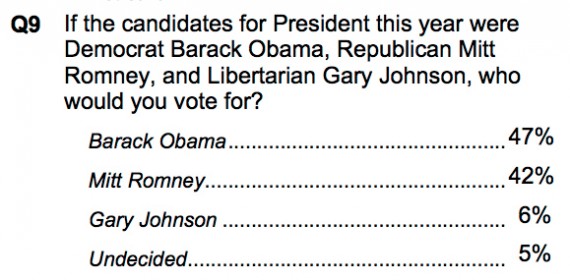Gary Johnson At 6% In New National Poll?
Buzzfeed points to a new national poll from Public Policy Polling that has surprised some people in the level of support it shows for Gary Johnson, former Governor of New Mexico, and current candidate for the Libertarian Party’s Presidential Nomination:
As much as this number pleases me as a Gary Johnson fan, I find myself agreeing with Patrick Caldwell that this probably doesn’t mean very much:
Has Ron Paul been right all along in predicting a rising tide of libertarian voters? Mark me down as a skeptic. In general, polls this far out from the election should be taken with a grain of salt. Most voters haven’t really tuned in and won’t for months to come. Beyond a handful of legitimate Johnson fans, I imagine the bulk of that 6 percent consists of voters who have paid scant attention to date, but have uneasy feelings about both Obama and Romney. When presented with a third generic option they’ll voice their dissent. And it’s hard to find a more generic middle-aged white guy name than Gary Johnson. For now he’s just a stand-in for their dissatisfaction with their options, one that will disappear once voters actually begin to tune in.
Yea, sadly I think this is about right. Johnson’s name recognition during the Republican primary race was somewhere down near Buddy Roemer territory, largely of course because he almost never got invited to any of the Republican debates and received scant attention at the two to which he was invited. It’s hard to believe that 6% of the respondents to the PPP poll know who Johnson is an endorse his ideas. It’s more likely that the vast majority of them are, like Caldwell said, disaffected voters who are largely annoyed with both sides at the moment.
Nonetheless, I’d like to hope that Johnson will get more attention that Libertarian candidates have in the past. As I’ve noted before, he certainly has the resume for it. However, I’m not going to hold my breath.



From the previous post linked to:
Yeah…that’s some fiscal brilliance right there.
Whoa, 6%!
What a coincidence, that’s the HUGE number of “independents” that people keep talking about.
@al-Ameda:
Nope.
According to the Exit Polls in 2008, 29% of the people voting identified themselves as “Independent.” The number was the same in the 2010 Exit Polls.
That just means 23% of the people self-identifying as Independents are embarrassed to admit they are Republicans.
Or 29% of the public is smart enough to know that there is no value in being associated with either one of our worthless major political parties
@Doug Mataconis:
Doug, I’ve seen those polls, and that 29% figure now tells me that 23% are inadvertently self-identifying themselves as less than truthful. People love to tell pollsters that they’re “independent” is sounds so objective, so rational, so above-it-all. And of course it can’t be true. And how do we know this? Empirical evidence – how do we end up with the dysfunctional mess that we have if nearly 1/3rd of the voters are so independent?
Gary Johnson polling at 6% wouldn’t be so surprising if Gallup, Rasmussen, CNN, CNBC, Fox, ABC, NYTimes and CBS included him in the polls in the first place. Gary Johnson, as the most probable Libertarian nominee for president (not set, we’ll know after the Libertarian convention in a few weeks), will be on the ballot in all 50 states. He should be in the presidential debates with Romney and Obama, but can’t unless he polls at 15%. But he can’t poll at 15% unless he’s included in other polls besides PPP.
Last year, when Johnson was polling higher than Huntsman and Santorum, Gallup, Rasmussen and CNN dropped Johnson. Why, if he was polling higher than Santorum and Huntsman? Why drop him if his numbers are higher? I have yet to see an article get a quote from any of those polling organizations as to why they dropped him when he was polling higher.
However, Johnson can’t get into the debates unless he is included in the polls, in which Johnson may or may not reach 15%. But why aren’t these organizations including Johnson?
I presume they really meant to say 0.6%.
While I adamantly oppose Johnson’s fiscal position, he’s light-years beyond the Democrats or Republicans on constitutional and civil liberties, and on accepting the American Century is over. I’ll most likely vote for him in November.
@Ben Wolf:
Ditto.
Libertarians seem to believe that if only they could get through to the populace, everyone would see the incredible wisdom that is libertarianism. I’m only one data point, but I suspect that the more that average voter knows, the more they will reject the libertarian candidate. It’s theoretical underpinnings resemble marxism in that both project forward from a fundamentally erroneous idea of human nature. Libertarianism comes down to saying “I don’t care how people act, I only care about how they should act. Let’s create a society based on that.”
@MarkedMan: The libertarian political positions all stem form the non aggression principal. Your description of only caring how people should act is not even close to the correct description. Libertarians know it is permissible to defend your liberty, We care how someone is acting when they start harming others or committing fraud, and recognize governments role in doing that. People should be finding out for themselves about what Libertarians represent, not learning from people who think they know what it is and post their thoughts. If you do not know what libertarians stand for I suggest you start researching it for yourselves and seek the truth.
@Ben Wolf:
Ditto, though honestly only because I’m in a safe Obama state.
@Liberty in our time: Lib, I’m not sure what you think I meant by “fundamentally erroneous view of human nature”. Let me be clear: I believe that for virtually all forms Libertarianism to be successful in setting up a government according to those principals, people would need to be different then they are. Here are two, out of many possible examples:
1) Libertarians feel that government should not get involved in marketplace issues except in cases of outright fraud, etc. But this means that individuals must “do battle” with corporations. Put another way, individuals, who have to work and raise families and have limited free time to investigate a company’s behavior and then do battle with them, look to government to uphold their interests against those corporations, who by the way can hire armies of lawyers, marketeers and so forth. Because people see that battle as unequal, they will continue to lobby for governments that they feel protect their interest.
2) Libertarians believe that a government that is substantially weaker than it is now can a) maintain robust laws against corporations (who in turn will be substantially stronger) behaving harmfully towards individuals or less powerful corporations, and b) successfully prosecute those laws. Hundreds of years of history shows us that the corporations will co-opt the government and lobby for laws that will make it difficult to stand against them.
Bottom line – IMHO, for a libertarian government to stand and be successful, people would have to be different than they are.
If Gary Johnson’s message gets out he will win the election. If all the voters were informed he’d win the election. If you click my name and this game goes viral Gary Johnson will win the election.